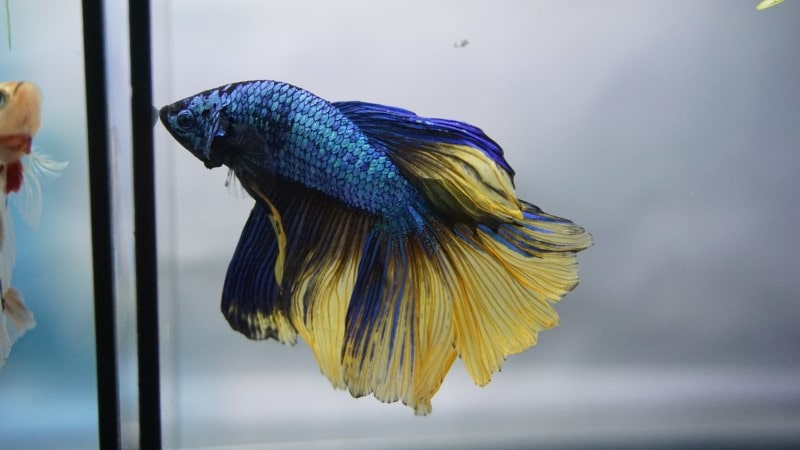Many people don’t realize that low maintenance betta fish need the temperature of their water to be between 78 and 80 degrees Fahrenheit (25.5 to 26.5 degrees Celsius). Do you have the proper equipment to keep your betta happy and healthy?
Betta fish have long been a favorite among aquarium hobbyists, but there is a long history of misinformation about these adorable and relatively hardy fish.
Many people believe these low maintenance fish have little to no habitat requirements. This leaves many people unable to provide the best life for their bettas.
Are you asking if the water is too cold for your betta? There are several things you should look out for in order to know whether you are doing enough for your betta.
As betta fish are relatively hardy, they won’t instantly die once water conditions are outside out of their preferred range. Are you are wondering if your betta will stay healthy in cold water?
While they may survive, they might not thrive. Certainly, being in colder water than they would like can make things a little bit stressful for them.
What Temperature Do Betta Fish Need?
The ideal temperature for a betta fish is between 78 and 80 degrees Fahrenheit (or 25.5 -26.5 degrees Celsius). They can handle temperatures significantly above and below these too.
You should keep betta fish in these temperatures in order to keep their bodies in tip-top shape.
Why Is Tank Temperature Important For Betta Fish?

When you don’t provide the right temperature for a fish, it puts significant stress on their bodies. This can mess up their metabolism and throw them off a bit.
Unlike humans who can simply put on a jacket or turn on a fan, a betta fish is at the mercy of the tank when it comes to their temperature.
Like many other animals, fish are cold-blooded. This is much different to the blood we have as warm-blooded animals.
We can get away with a wider range of temperatures as our internal temperature is generally maintained at about the same level.
This is because our body temperature id dictated by internal factors. When an animal is cold-blooded, they rely on their surrounding area.
When the surrounding water is too cold or warm, it can gravely impact the internal temperature of betta fish.
What Is The Maximum Temperature A Betta Can Be Kept At?
The maximum temperature a betta fish can really thrive at is about 83 degrees Fahrenheit, but this doesn’t mean that a betta fish will not survive in warmer temperatures.
When an animal becomes too hot, it can become dangerous for them rather quickly. Considering 80 degrees is already pretty warm for water, it’s wise not to push it beyond that.
How Cold Is Too Cold For A Betta Fish?
Betta fish should really not be kept in tanks which have an internal temperature of under 75 degrees Fahrenheit. These fish come from warmer regions, and this is something you should keep in mind.
In Asian rice paddies, where their ancestors hail from, the climate is quite warm.
While many of them may have had to deal with some bad days here and there, they would hardly ever encounter cold water.
What Happens If You Put A Betta In Cold Or Hot Water?
What happens when you don’t keep your betta at a safe temperature? You can expect it to impact their health.
There are several symptoms, both physical and behavioral, which you might notice.
On the physical side, you may notice that your betta starts to lack color. Many fish express their wellbeing through the color of their scales.
Bettas especially tend to go through some pretty intense transformations with their colors, so you should not panic if you notice drastic color changes but no other symptoms.
On the other hand, if your betta becomes dull and sluggish, you may want to consider making some changes to your aquarium.
You may also notice signs of illness which can be an indirect cause of the stress a betta endures due to improper temperature.
More common illnesses can involve bacteria or fungi. If you notice that your betta have white spots all over their tails or gills, you may want to get some medication.
The same can be said if you notice that their fins look shredded or wilted.
There are some behavioral changes which can also arise from not keeper your betta in a proper tank. First and foremost, if the tank’s water is too hot or cold, you can expect your betta to become sluggish.
In addition to experiencing diminished energy levels, they may also be reluctant to eat anything and may not explore the tank as much as they normally would.
Should I Get A Heater For My Betta?
Unless you live in a tropical region where the weather is almost always warm, it’s a smart idea to invest in a heater.
Heaters are a great way of making sure that your betta always have access to the best possible habitat. For the most part, the water temperature should never get too high for them.
Coolers are only an option if you notice that the water temperature really seems to climb up. In this case, try to make sure you keep the tank out of direct sunlight.
In winter months, it is important to have a heater in the tank to warm it up a bit. Even if you have opted to keep your betta in a smaller tank, there are some nice small heaters which they can benefit from.
Many of these heaters have feedback systems, so you will never need to worry about boiling your tank if you don’t pay attention.
When you get a betta fish, it is important you do everything you can to make sure it stays happy and healthy.
Part of this responsibility means you must make sure your betta is kept at the correct temperature. These hardy fish have more requirements than a lot of people realize.
If you have any experience with keeping your betta tank warm, we would love to hear from you. Comment below with all your stories and advice!

